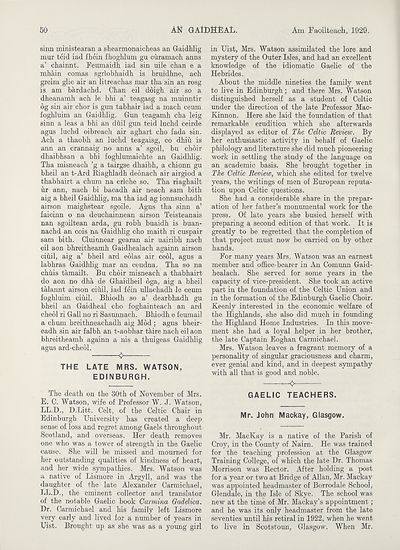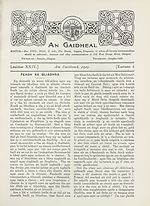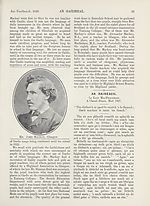An Comunn Gàidhealach Publications > Gaidheal > Volume 24, October 1928--September 1929
(58) Page 50
Thumbnail gallery: Grid view | List view

50
AN GAlDHNAL.
Am Faoiiteacii, 1929.
sinn ministearan a shearmonaicheas an Gaidhlig
mur teid iad fhein fhoghlum gu curamach anns
a’ chairmt. Fenmaidh iad sin uile chan e a
mhain comas sgriobhaidh is bruidhne, ach
greim glic air an litreachas mar tha sin an rosg
is am bardachd. Chan eil doigh air so a
dheanamh ach le bhi a’ teagasg na muinntir
6g sin air chor is gun tabhair iad a mach ceum
foghluim an Gaidhlig. Gun teagamh cha leig
sinn a leas a bhi an duil gun teid luchd ceirde
agus luchd oibreach air aghart cho fada sin.
Ach a thaobh an luchd teagaisg, co dhiu is
ann an crannaig no anns a’ sgoil, bu choir
dhaibhsan a bhi foghlumaichte an Gaidhlig.
Tha misneach ’g a tairgse dhaibh, a chionn gu
bheil an t-Ard Riaghladh deonach air airgiod a
thabhairt a chum na crlche so. Tha riaghailt
ur ann, nach bi bacadh air neach sam bith
aig a bheil Gaidhlig, ma tha iad ag ionnsuchadh
airson maighstear sgoile. Agus tha sinn a’
faicinn o na deuchainnean airson Teisteanais
nan sgoiltean arda, gu robh buaidh is buan-
nachd an cois na Gaidhlig cho maith ri cuspair
sam bith. Cluinnear gearan air uairibh nach
eil aon bhreitheamh Gaidhealach againn airson
ciuil, aig a’ bheil ard eolas air ceol, agus a
labhras Gaidhlig mar an ceudna. Tha so na
chuis tamailt. Bu choir misneach a thabhairt
do aon no dha de Ghaidheil oga, aig a bheil
talannt airson ciuil, iad fein ullachadh le ceum
foghluim ciuil. Bhiodh so a’ dearbhadh gu
bheil an Gaidheal cho foghainteach an ard
cheol ri Gall no ri Sasunnach. Bhiodh e feumail
a chum breithneachadh aig Mod ; agus bheir-
eadh sin air falbh an t-aobhar taire nach eil aon
bhreitheamh againn a nis a thuigeas Gaidhlig
agus ard-cheol.
C>
THE LATE MRS. WATSON,
EDINBURGH.
The death on the 30th of November of Mrs.
E. C. Watson, wife of Professor W. J. Watson,
LL.D., D.Litt. Celt, of the Celtic Chair in
Edinburgh University has created a deep
sense of loss and regret among Gaels throughout
Scotland, and overseas. Her death removes
one who was a tower of strength in the Gaelic
cause. She will be missed and mourned for
her outstanding qualities of kindness of heart,
and her wide sympathies. Mrs. Watson was
a native of Lismore in Argyll, and was the
daughter of the late Alexander Carmichael,
LL.D., the eminent collector and translator
of the notable Gaelic book Garmina Gaddica.
Dr. Carmichael and his family left Lismore
very early and lived for a number of years in
Uist. Brought up as she was as a young girl
in Uist, Mrs. Watson assimilated the lore and
mystery of the Outer Isles, and had an excellent
knowledge of the idiomatic Gaelic of the
Hebrides.
About the middle nineties the family went
to live in Edinburgh; and there Mrs. Watson
distinguished herself as a student of Celtic
under the direction of the late Professor Mac¬
Kinnon. Here she laid the foundation of that
remarkable erudition which she afterwards
displayed as editor of The Celtic Review. By
her enthusiastic activity in behalf of Gaelic
philology and literature she did much pioneering
work in settling the study of the language on
an academic basis. She brought together in
The Celtic Review, which she edited for twelve
years, the writings of men of European reputa¬
tion upon Celtic questions.
She had a considerable share in the prepar¬
ation of her father’s monumental work for the
press. Of late years she busied herself with
preparing a second edition of that work. It is
greatly to be regretted that the completion of
that project must now be carried on by other
hands.
For many years Mrs. Watson was an earnest
member and office-bearer in An Comunn Gaid¬
healach. She served for some years in the
capacity of vice-president. She took an active
part in the foundation of the Celtic Union and
in the formation of the Edinburgh Gaelic Choir.
Keenly interested in the economic welfare of
the Highlands, she also did much in founding
the Highland Home Industries. In this move¬
ment she had a loyal helper in her brother,
the late Captain Eoghan Carmichael.
Mrs. Watson leaves a fragrant memory of a
personality of singular graciousness and charm,
ever genial and kind, and in deepest sympathy
with all that is good and noble.
GAELIC TEACHERS.
Mr. John) Maokay, Glasgow.
Mr. MacKay is a native of the Parish of
Croy, in the County of Nairn. He was trained
for the teaching profession at the Glasgow
Training College, of which the late Dr. Thomas
Morrison was Rector. After holding a post
for a year or two at Bridge of Allan, Mr. Mackay
was appointed headmaster of Borrodale School,
Glendale, in the Isle of Skye. The school was
new at the time of Mr. Mackay’s appointment;
and he was its only headmaster from the late
seventies until his retiral in 1922, when he went
to live in Scotstoun, Glasgow. When Mr.
AN GAlDHNAL.
Am Faoiiteacii, 1929.
sinn ministearan a shearmonaicheas an Gaidhlig
mur teid iad fhein fhoghlum gu curamach anns
a’ chairmt. Fenmaidh iad sin uile chan e a
mhain comas sgriobhaidh is bruidhne, ach
greim glic air an litreachas mar tha sin an rosg
is am bardachd. Chan eil doigh air so a
dheanamh ach le bhi a’ teagasg na muinntir
6g sin air chor is gun tabhair iad a mach ceum
foghluim an Gaidhlig. Gun teagamh cha leig
sinn a leas a bhi an duil gun teid luchd ceirde
agus luchd oibreach air aghart cho fada sin.
Ach a thaobh an luchd teagaisg, co dhiu is
ann an crannaig no anns a’ sgoil, bu choir
dhaibhsan a bhi foghlumaichte an Gaidhlig.
Tha misneach ’g a tairgse dhaibh, a chionn gu
bheil an t-Ard Riaghladh deonach air airgiod a
thabhairt a chum na crlche so. Tha riaghailt
ur ann, nach bi bacadh air neach sam bith
aig a bheil Gaidhlig, ma tha iad ag ionnsuchadh
airson maighstear sgoile. Agus tha sinn a’
faicinn o na deuchainnean airson Teisteanais
nan sgoiltean arda, gu robh buaidh is buan-
nachd an cois na Gaidhlig cho maith ri cuspair
sam bith. Cluinnear gearan air uairibh nach
eil aon bhreitheamh Gaidhealach againn airson
ciuil, aig a’ bheil ard eolas air ceol, agus a
labhras Gaidhlig mar an ceudna. Tha so na
chuis tamailt. Bu choir misneach a thabhairt
do aon no dha de Ghaidheil oga, aig a bheil
talannt airson ciuil, iad fein ullachadh le ceum
foghluim ciuil. Bhiodh so a’ dearbhadh gu
bheil an Gaidheal cho foghainteach an ard
cheol ri Gall no ri Sasunnach. Bhiodh e feumail
a chum breithneachadh aig Mod ; agus bheir-
eadh sin air falbh an t-aobhar taire nach eil aon
bhreitheamh againn a nis a thuigeas Gaidhlig
agus ard-cheol.
C>
THE LATE MRS. WATSON,
EDINBURGH.
The death on the 30th of November of Mrs.
E. C. Watson, wife of Professor W. J. Watson,
LL.D., D.Litt. Celt, of the Celtic Chair in
Edinburgh University has created a deep
sense of loss and regret among Gaels throughout
Scotland, and overseas. Her death removes
one who was a tower of strength in the Gaelic
cause. She will be missed and mourned for
her outstanding qualities of kindness of heart,
and her wide sympathies. Mrs. Watson was
a native of Lismore in Argyll, and was the
daughter of the late Alexander Carmichael,
LL.D., the eminent collector and translator
of the notable Gaelic book Garmina Gaddica.
Dr. Carmichael and his family left Lismore
very early and lived for a number of years in
Uist. Brought up as she was as a young girl
in Uist, Mrs. Watson assimilated the lore and
mystery of the Outer Isles, and had an excellent
knowledge of the idiomatic Gaelic of the
Hebrides.
About the middle nineties the family went
to live in Edinburgh; and there Mrs. Watson
distinguished herself as a student of Celtic
under the direction of the late Professor Mac¬
Kinnon. Here she laid the foundation of that
remarkable erudition which she afterwards
displayed as editor of The Celtic Review. By
her enthusiastic activity in behalf of Gaelic
philology and literature she did much pioneering
work in settling the study of the language on
an academic basis. She brought together in
The Celtic Review, which she edited for twelve
years, the writings of men of European reputa¬
tion upon Celtic questions.
She had a considerable share in the prepar¬
ation of her father’s monumental work for the
press. Of late years she busied herself with
preparing a second edition of that work. It is
greatly to be regretted that the completion of
that project must now be carried on by other
hands.
For many years Mrs. Watson was an earnest
member and office-bearer in An Comunn Gaid¬
healach. She served for some years in the
capacity of vice-president. She took an active
part in the foundation of the Celtic Union and
in the formation of the Edinburgh Gaelic Choir.
Keenly interested in the economic welfare of
the Highlands, she also did much in founding
the Highland Home Industries. In this move¬
ment she had a loyal helper in her brother,
the late Captain Eoghan Carmichael.
Mrs. Watson leaves a fragrant memory of a
personality of singular graciousness and charm,
ever genial and kind, and in deepest sympathy
with all that is good and noble.
GAELIC TEACHERS.
Mr. John) Maokay, Glasgow.
Mr. MacKay is a native of the Parish of
Croy, in the County of Nairn. He was trained
for the teaching profession at the Glasgow
Training College, of which the late Dr. Thomas
Morrison was Rector. After holding a post
for a year or two at Bridge of Allan, Mr. Mackay
was appointed headmaster of Borrodale School,
Glendale, in the Isle of Skye. The school was
new at the time of Mr. Mackay’s appointment;
and he was its only headmaster from the late
seventies until his retiral in 1922, when he went
to live in Scotstoun, Glasgow. When Mr.
Set display mode to:
![]() Universal Viewer |
Universal Viewer | ![]() Mirador |
Large image | Transcription
Mirador |
Large image | Transcription
| An Comunn Gàidhealach > An Comunn Gàidhealach Publications > Gaidheal > Volume 24, October 1928--September 1929 > (58) Page 50 |
|---|
| Permanent URL | https://digital.nls.uk/125295192 |
|---|
| Description | This contains items published by An Comunn, which are not specifically Mòd-related. It includes journals, annual reports and corporate documents, policy statements, educational resources and published plays and literature. It is arranged alphabetically by title. |
|---|
| Description | A collection of over 400 items published by An Comunn Gàidhealach, the organisation which promotes Gaelic language and culture and organises the Royal National Mòd. Dating from 1891 up to the present day, the collection includes journals and newspapers, annual reports, educational materials, national Mòd programmes, published Mòd literature and music. |
|---|---|
| Additional NLS resources: |
|

